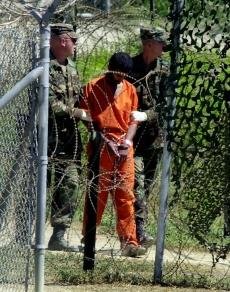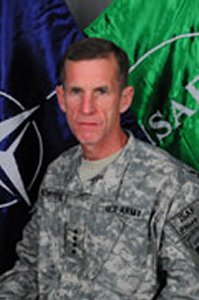« NFL USO Coaches Tour To Iraq To Vist Our Troops | Main | Obama's Stupid New ROE As Taliban Fighters Dress As Women To Escape Marines »
July 07, 2009
Mullah Sprung From GITMO Jail Now Leads Taliban Fighting US Troops in Afghanistan

A former Gitmo detainee is leading the Taliban in Afghanistan in fighting the US in Afghanistan's Helmand Province.
KABUL, Afghanistan
As Marine Corps forces roll into southern Afghanistan, they face an enemy familiar to US officials -- Mullah Zakir, a former Guantanamo Bay prisoner who now leads a reconstituted Taliban.
Abdul Qayum Zakir, also known as Abdullah Ghulam Rasoul, is from Helmand Province and has taken a circuitous route to become head of the radical Islamic group.
Zakir was a senior fighter during the Taliban regime in the 1990s. In a memorandum prepared for his administrative review board at Guantanamo, Zakir apparently "felt it would be fine to wage jihad against Americans, Jews, or Israelis if they were invading his country."
And he acknowledged that he was "called to fight jihad in approximately 1997," when he joined the Taliban.
In 2001, he surrendered to US and Afghan forces in the northern city of Mazar-e-Sharif as the regime was collapsing. He spent the next several years in custody, was transferred to Guantanamo around 2006, then to Afghanistan government custody in late 2007, and was eventually released around May 2008. American officials won't say why he was let go and have not released a photograph of him.
Zakir wasted little time rekindling his relationship with the Taliban, especially its inner shura, or leadership council, based in Pakistan. According to some accounts, Taliban leader Mullah Mohammed Omar appointed Zakir as a senior military commander in mid-2008. He quickly developed a reputation as a charismatic leader.
The Taliban, apparently concerned that some governors and military commanders had become ineffective and bracing for the growing US military presence, announced its own new strategy in April.
They called it Operation Nasrat ("victory") and pledged to use "ambushes, offensives, explosions, martyrdom-seeking attacks, and surprise attacks." The Taliban also warned that they would attack "military units of the invading forces, diplomatic centers, mobile convoys and high-ranking officials" of the Afghan government.
As Marines move through Helmand, they will be on the lookout for Zakir and his support network. But like many senior Taliban leaders, Zakir spends a lot of time in Pakistani cities like Quetta and Karachi, frightened he'll be killed in an attack.
.

OH But that is not enough , because you see Obama wants to make sure the Taliban has every chance possible not to be taken out. ~ Wild Thing

Directive Re-emphasizes Protecting Afghan Civilians
WASHINGTON
A new tactical directive for coalition forces serving in Afghanistan re-emphasizes the importance of preventing civilian casualties.
Army Gen. Stanley A. McChrystal, commander of NATO’s International Security Assistance Force and U.S. Forces Afghanistan, released the directive July 2. It builds on previous tactics and is much clearer about use of close-air support, searching Afghan houses and protecting Afghan cultural and religious sensitivities. All coalition forces in Afghanistan must follow the directive.
Taliban fighters use a tactic of engaging coalition forces from positions that expose Afghan civilians to danger. Close-air support of coalition and Afghan personnel engaged in a May 4 firefight with the Taliban in Afghanistan’s Farah province killed numerous civilians. The Taliban cite such incidents to lead people to believe the NATO-led force does not care for Afghan civilians.
McChrystal’s tactical directive emphasizes that ISAF is in Afghanistan to protect the people from the insurgents. “Like any insurgency, there is a struggle for support and will of the population,” he wrote. “Gaining and maintaining that support must be our overriding operational imperative – and the ultimate objective of every action we take.”
Still, the directive does not prevent commanders from protecting the lives of their troops engaged in direct combat.
The directive is general because the nature of a counterinsurgency is complex and no one can foresee all eventualities, officials said. McChrystal expects commanders at all levels to understand the directive and use it when planning and conducting operations.
“Following this intent requires a cultural shift within our forces – and complete understanding at every level,” he wrote.
The tactical guidance takes the new strategy for Afghanistan as its base, recognizing that ISAF and Afghan forces may win tactical victories against the Taliban, but lose the war. “We must avoid the trap of winning tactical victories – but suffering strategic defeats – by causing civilian casualties or excessive damage and thus alienating the people,” McChrystal wrote.
Specifically, the directive calls on commanders “to scrutinize and limit the use of force like close air support against residential compounds and other locations likely to produce civilian casualties.” Bombing residential compounds will be allowed only under very limited conditions, the directive says. For example, if a coalition force comes in contact with Taliban fighters and the enemy takes cover in a residential compound, the NATO force can break contact and wait out the enemy rather than calling for close-air support.
Another portion of the directive states that any search of Afghan homes will be done by Afghan security forces with the support of local authorities.
“No ISAF forces will enter or fire upon, or fire into a mosque or any religious or historical site except in self-defense,” McChrystal wrote in the directive. “All searches and entries for any other reason will be conducted by the Afghan National Security Forces.”
The directive is not a departure from past practices, officials said, noting that killing civilians never has been an International Security Assistance Force tactic.
“Working together with our Afghan partners, we can overcome the enemy’s influence and give the Afghan people what they deserve: a country at peace for the first time in three decades, foundations of good governance and economic development,” McChrystal said.
.

Wild Thing's comment......
I blame Obama this comes from him, he is the CIC and he may not have let the prisoner out, that was under Bush. BUT Obama is the one that has chnged the ROE.
Posted by Wild Thing at July 7, 2009 05:45 AM
Comments
The MSM, the Democrats and muslim activists pushed for release of Gitmo detainees. Bush acquiesced. Zakir doesn't seem like the bravest of people. Maybe this time the troops will kill him.
Keep your eyes on Gen McChrystal. I have some worries about him. He may be one of those officers who puts career ahead of his troops. I hope I am wrong.
Posted by: TomR at July 7, 2009 11:49 AM
Tom, thank you, I have been wondering about
Gen McChrystal.
The way they let go of Gen.David McKiernan
so abrupt. He led ground attack that toppled Iraq’s Saddam Hussein in 2003.
Posted by: Wild Thing at July 7, 2009 11:38 PM
